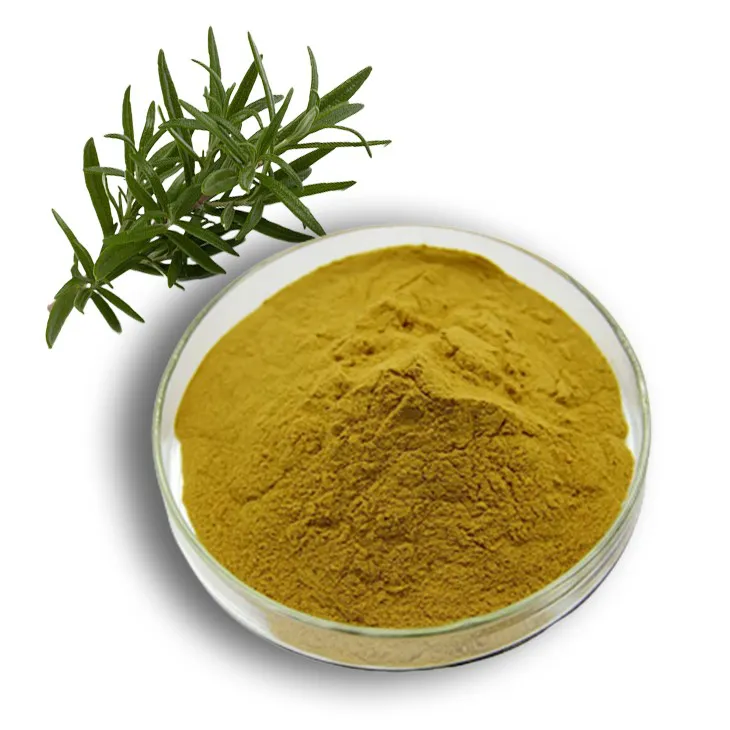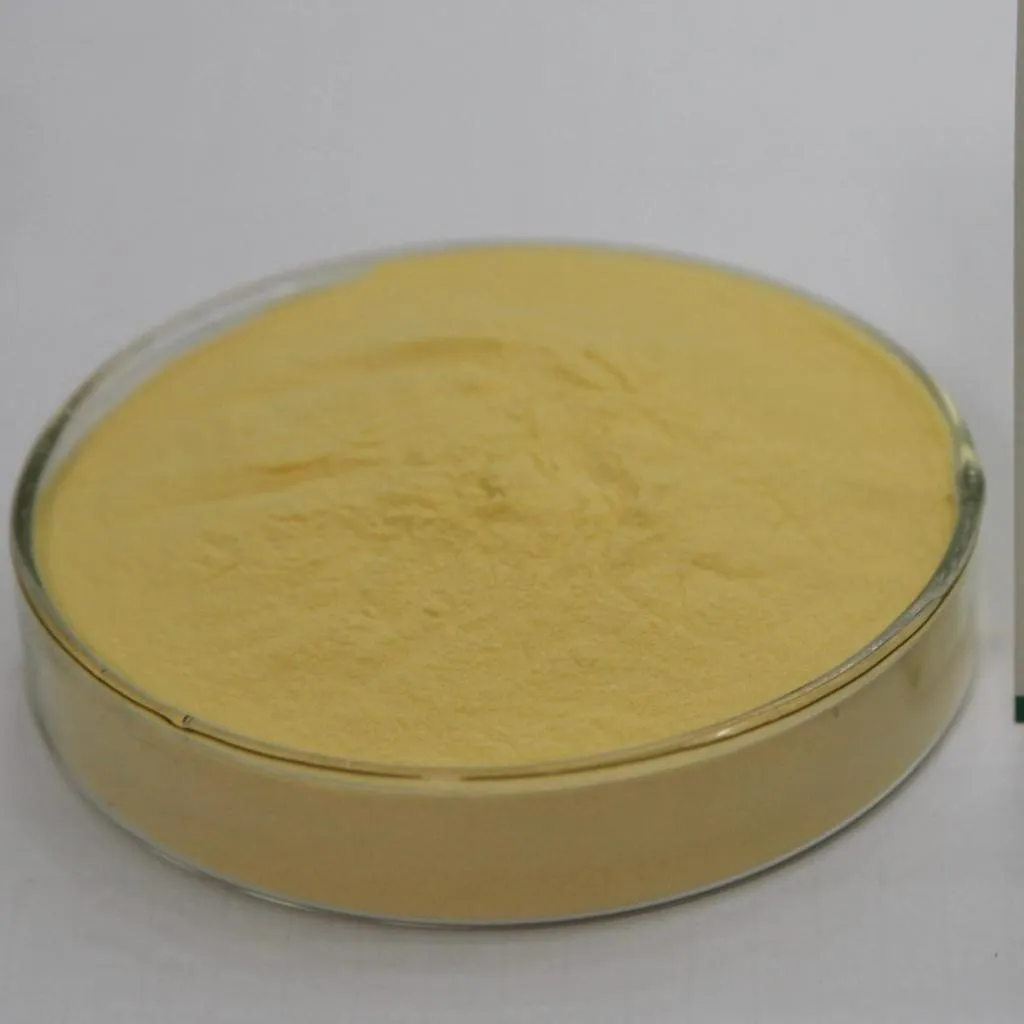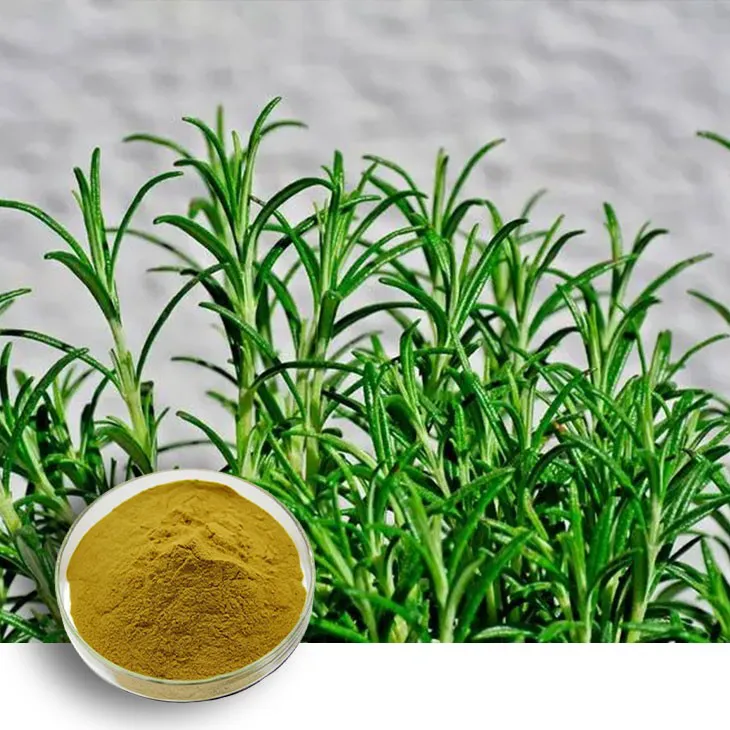- 0086-571-85302990
- sales@greenskybio.com
5 Benefits of Rosemary Extract + Dosage, Side Effects
2024-11-13

1. Introduction
Rosemary (Rosmarinus officinalis) is a fragrant herb that has been used for centuries in cooking, traditional medicine, and even in religious ceremonies. Rosemary extract, which is derived from this herb, has gained significant attention in recent years due to its numerous potential health benefits. In this article, we will explore five of the most remarkable benefits of Rosemary extract, as well as discuss the recommended dosage and possible side effects.

2. Benefit 1: Antibacterial Properties
Rosemary extract is well - known for its antibacterial capabilities. It contains various compounds such as rosmarinic acid, carnosic acid, and cineole, which have been shown to inhibit the growth of harmful bacteria.
2.1. How it Works
These active compounds in rosemary extract disrupt the cell membranes of bacteria, interfering with their normal functions. For example, they can prevent bacteria from reproducing or synthesizing essential proteins. This antibacterial action can be beneficial for the body in several ways.
2.2. Applications
- Food Preservation: Rosemary extract can be used as a natural preservative in food products. It helps to extend the shelf - life of foods by inhibiting the growth of spoilage - causing bacteria such as Salmonella and Escherichia coli.
- Oral Health: In oral care products, rosemary extract can combat bacteria in the mouth that are responsible for causing cavities, gum disease, and bad breath. It may be found in some natural toothpastes and mouthwashes.
- Skin Health: When applied topically, rosemary extract can help prevent skin infections by fighting off bacteria that can colonize on the skin. It may be used in creams and lotions for this purpose.

3. Benefit 2: Promotes Hair Growth
Another significant benefit of rosemary extract is its role in promoting hair growth and enhancing the health of hair follicles.
3.1. Mechanisms behind Hair Growth Promotion
Rosemary extract improves blood circulation to the scalp. This increased blood flow delivers more nutrients and oxygen to the hair follicles, which are essential for their proper function and growth. Additionally, it has antioxidant properties that can protect the hair follicles from damage caused by free radicals.
3.2. Studies and Evidence
Some studies have compared rosemary extract to minoxidil, a common hair growth treatment. Results have shown that rosemary extract can be just as effective in promoting hair growth in some cases. For example, in a study on patients with androgenetic alopecia (a common form of hair loss), rosemary extract applied topically over a period of time showed significant improvement in hair density.
3.3. How to Use for Hair Growth
- Hair Masks: You can make a hair mask by mixing rosemary extract with other natural ingredients such as coconut oil or aloe vera gel. Apply the mask to your scalp and hair, leave it on for about 30 minutes, and then wash it out.
- Rinses: Add a few drops of rosemary extract to a cup of warm water and use it as a final rinse after shampooing. This can help to nourish the hair and scalp.

4. Benefit 3: Regulates Blood Sugar Levels
For diabetics and those at risk of developing diabetes, rosemary extract's ability to regulate blood sugar levels is of great importance.
4.1. Influence on Insulin Sensitivity
Rosemary extract can improve insulin sensitivity. Insulin is a hormone that helps cells take up glucose from the blood. When cells become more sensitive to insulin, they are better able to absorb glucose, which helps to keep blood sugar levels in check. This is achieved through various mechanisms, including the modulation of certain signaling pathways in cells.
4.2. Glycemic Control
Studies have shown that regular consumption of rosemary extract can lead to a reduction in fasting blood glucose levels. It may also help to reduce post - prandial (after - meal) blood sugar spikes. This makes it a potentially useful supplement for individuals with type 2 diabetes or those with pre - diabetes.
4.3. Dietary Considerations
- Incorporating in Diet: Rosemary can be easily incorporated into the diet. You can add fresh rosemary to your cooking, such as in roasted meats, vegetables, or soups. This way, you can benefit from its blood - sugar - regulating properties in a natural way.
- Supplements: In addition to dietary intake, rosemary extract supplements are also available. However, it is important to consult a healthcare provider before starting any new supplement, especially if you have diabetes or are taking medications for blood sugar control.

5. Benefit 4: Anti - inflammatory Effects
Rosemary extract exhibits strong anti - inflammatory effects, which can be beneficial for a variety of health conditions.
5.1. Inflammatory Markers
It helps to reduce the levels of inflammatory markers in the body, such as C - reactive protein (CRP) and interleukin - 6 (IL - 6). High levels of these markers are associated with chronic inflammation, which is linked to many diseases, including heart disease, arthritis, and certain cancers.
5.2. Applications in Health Conditions
- Arthritis: In arthritis, the anti - inflammatory properties of rosemary extract can help to reduce joint pain and swelling. It may work by inhibiting the production of inflammatory mediators in the joints.
- Cardiovascular Health: By reducing inflammation in the blood vessels, rosemary extract may contribute to better cardiovascular health. It can help to prevent the formation of atherosclerotic plaques, which are associated with heart attacks and strokes.
- Skin Inflammation: For skin conditions such as eczema and psoriasis, rosemary extract can be applied topically to soothe inflammation and reduce redness and itching.
6. Benefit 5: Cognitive Function Improvement
Rosemary extract has also been shown to have a positive impact on cognitive function.
6.1. Brain - protecting Properties
It contains antioxidants that can protect the brain from oxidative stress. Oxidative stress in the brain can lead to damage of neurons and is associated with cognitive decline and neurodegenerative diseases such as Alzheimer's and Parkinson's. By neutralizing free radicals, rosemary extract helps to maintain the health of brain cells.
6.2. Memory and Concentration
Studies have suggested that rosemary extract can improve memory and concentration. It may enhance neurotransmitter function in the brain, particularly acetylcholine, which is important for learning and memory processes. In some experiments, participants who were exposed to the aroma of rosemary or took rosemary extract supplements showed improved cognitive performance in tasks related to memory and attention.
7. Dosage
The appropriate dosage of rosemary extract can vary depending on several factors, including the form of the extract (e.g., liquid, capsule), the intended use, and individual factors such as age and overall health.
7.1. Dietary Use
When using rosemary as a spice in cooking, there is no strict limit on the amount used. However, if you are using rosemary extract in the form of a supplement, a general guideline is to start with a low dose, such as 100 - 200 mg per day, and gradually increase if needed. It is important to follow the instructions on the product label.
7.2. Topical Use
For topical applications, such as for hair or skin, the concentration of rosemary extract in the product can vary. It is advisable to follow the instructions provided with the specific topical product. For example, in a hair mask, you might use a few drops of a concentrated rosemary extract oil diluted in a carrier oil.
8. Side Effects
While rosemary extract is generally considered safe for most people, there are some potential side effects to be aware of.
8.1. Allergic Reactions
Some individuals may be allergic to rosemary. Allergic reactions can range from mild symptoms such as skin rashes, itching, or redness to more severe reactions like difficulty breathing or swelling of the face, lips, or tongue. If you experience any signs of an allergic reaction after using rosemary extract, discontinue use immediately and seek medical attention.
8.2. Gastrointestinal Issues
In some cases, high doses of rosemary extract may cause gastrointestinal problems such as nausea, vomiting, or stomach cramps. This is more likely to occur when taking large amounts of the supplement rather than from normal dietary intake. To avoid such issues, it is important to follow the recommended dosage.
8.3. Interaction with Medications
Rosemary extract may interact with certain medications. For example, it may enhance the effects of blood - thinning medications, increasing the risk of bleeding. If you are taking any medications, it is crucial to consult your healthcare provider before starting to use rosemary extract supplements.
9. Conclusion
Rosemary extract offers a wide range of potential benefits, from its antibacterial properties to its positive effects on hair growth, blood sugar regulation, anti - inflammation, and cognitive function. However, it is important to use it in appropriate dosages and be aware of the possible side effects. Whether you choose to incorporate rosemary into your diet as a spice or use rosemary extract in the form of supplements or topical products, consulting a healthcare provider or a qualified nutritionist can help ensure that you make the most of this natural remedy while maintaining your health and safety.
FAQ:
What are the antibacterial mechanisms of rosemary extract?
Rosemary extract contains various compounds such as rosmarinic acid. These compounds can disrupt the cell membranes of bacteria, interfere with their metabolic processes, and prevent their growth and reproduction, thus showing antibacterial capabilities.
How does rosemary extract promote hair growth exactly?
Rosemary extract can improve blood circulation in the scalp. By providing more nutrients and oxygen to the hair follicles, it helps create a more favorable environment for hair growth. Additionally, it may also have an impact on certain hormones related to hair growth.
What is the recommended dosage of rosemary extract for regulating blood sugar?
The recommended dosage can vary depending on factors such as an individual's health condition and age. Generally, for adults, it may be in the range of 500 - 1000 mg per day. However, it is always best to consult a healthcare professional before starting any supplementation.
Are there any side effects of taking rosemary extract?
Some people may experience mild side effects such as stomach upset or allergic reactions. In rare cases, it may interact with certain medications. If any unusual symptoms occur after taking rosemary extract, it is important to stop using it and seek medical advice.
Can rosemary extract be used topically for hair health?
Yes, it can. Rosemary extract can be added to hair products like shampoos or hair oils. When applied topically, it can directly affect the scalp and hair follicles, potentially improving hair health, reducing dandruff, and promoting hair growth.
Related literature
- The Antibacterial Properties of Rosemary Extract: A Comprehensive Review"
- "Rosemary Extract and Hair Growth: Mechanisms and Efficacy"
- "Rosemary Extract in Blood Sugar Regulation: Clinical Studies"
- ▶ Hesperidin
- ▶ citrus bioflavonoids
- ▶ plant extract
- ▶ lycopene
- ▶ Diosmin
- ▶ Grape seed extract
- ▶ Sea buckthorn Juice Powder
- ▶ Beetroot powder
- ▶ Hops Extract
- ▶ Artichoke Extract
- ▶ Reishi mushroom extract
- ▶ Astaxanthin
- ▶ Green Tea Extract
- ▶ Curcumin Extract
- ▶ Horse Chestnut Extract
- ▶ Other Problems
- ▶ Boswellia Serrata Extract
- ▶ Resveratrol Extract
- ▶ Marigold Extract
- ▶ Grape Leaf Extract
- ▶ blog3
- ▶ Aminolevulinic acid
- ▶ Cranberry Extract
- ▶ Red Yeast Rice
- ▶ Red Wine Extract
-
Astaxanthin
2024-11-13
-
Curcuma Longa Extract/Turmeric extract
2024-11-13
-
Shikonin
2024-11-13
-
Green coffee bean Extract
2024-11-13
-
Kidney Bean Extract
2024-11-13
-
Grapefruit Seed Extract Powder
2024-11-13
-
Dandelion Leaf Extract
2024-11-13
-
Hedyotis Diffusa Extract
2024-11-13
-
Tongkat Ali Extract Powder
2024-11-13
-
Polygonum multiflorum extract
2024-11-13





















